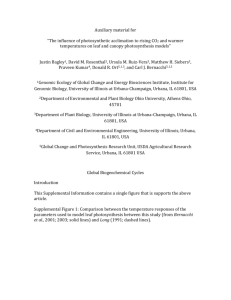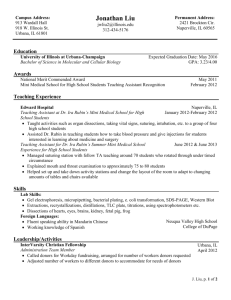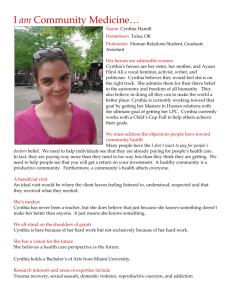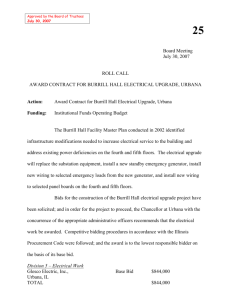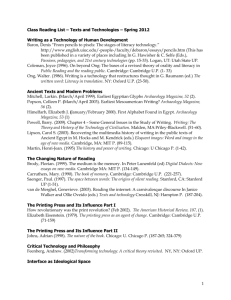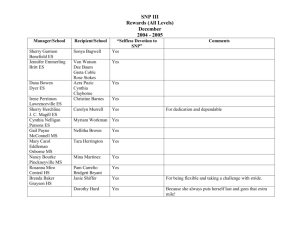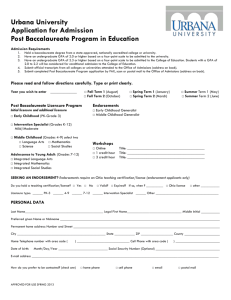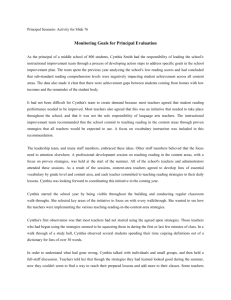Letizia Guglielmo - Rhetoric and Composition
advertisement
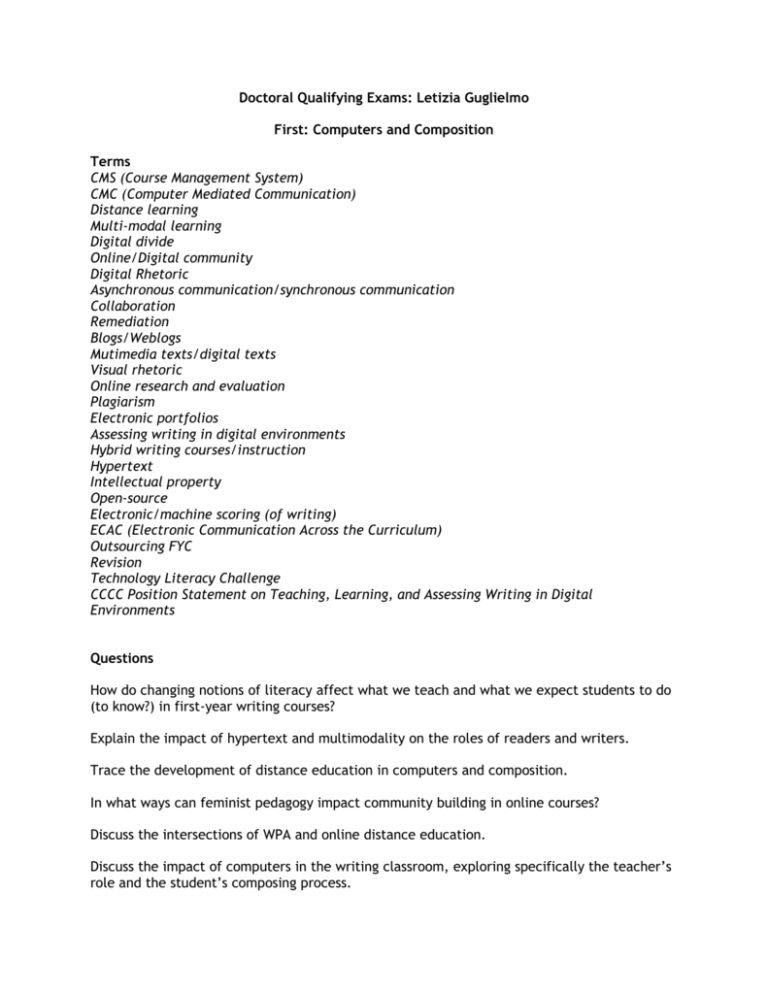
Doctoral Qualifying Exams: Letizia Guglielmo First: Computers and Composition Terms CMS (Course Management System) CMC (Computer Mediated Communication) Distance learning Multi-modal learning Digital divide Online/Digital community Digital Rhetoric Asynchronous communication/synchronous communication Collaboration Remediation Blogs/Weblogs Mutimedia texts/digital texts Visual rhetoric Online research and evaluation Plagiarism Electronic portfolios Assessing writing in digital environments Hybrid writing courses/instruction Hypertext Intellectual property Open-source Electronic/machine scoring (of writing) ECAC (Electronic Communication Across the Curriculum) Outsourcing FYC Revision Technology Literacy Challenge CCCC Position Statement on Teaching, Learning, and Assessing Writing in Digital Environments Questions How do changing notions of literacy affect what we teach and what we expect students to do (to know?) in first-year writing courses? Explain the impact of hypertext and multimodality on the roles of readers and writers. Trace the development of distance education in computers and composition. In what ways can feminist pedagogy impact community building in online courses? Discuss the intersections of WPA and online distance education. Discuss the impact of computers in the writing classroom, exploring specifically the teacher’s role and the student’s composing process. Reading List Alexander, Jonathan. “Out of the Closet and into the Network: Sexual Orientation and the Computerized Classroom.” Computers and Composition 14 (1997): 207-16. Rpt. Computers in the Composition Classroom: A Critical Sourcebook. Ed. Michelle Sider, Richard Morris, Elizabeth Overman Smith. Boston: Bedford/St. Martin's, 2008. 207-17. Alexander, Jonathan and William P. Banks. "Sexualities, Technologies, and the Teaching of Writing: A Critical Overview." Computers and Composition 21.3 (2004): 271-397. Allen, Michael. "Adventures with 'Robin Hood': Gender and Conflict on a First-Year Bulletin Board." Journal of Teaching Writing 13.1-2 (1994): 169-96. Amore, Paul. "The Agency of Collaboration: Hypertext and Positive Plagiarism." Assembly on Computers in English Journal 1.3 (1998): 27-45. Anson, Chris M. “Distant Voices: Teaching and Writing in a Culture of Technology.” College English 61.3 (1999): 261-80. Rpt. Computers in the Composition Classroom: A Critical Sourcebook. Ed. Michelle Sider, Richard Morris, Elizabeth Overman Smith. Boston: Bedford/St. Martin's, 2008. 46-63. Bacig, Thomas D., Robert A. Evans, and Donald W. Larmouth. "Computer-Assisted Instruction in Critical Thinking and Writing: A Process/Model Approach." Research in the Teaching of English 25.3 (October 1991): 364-83. Barber, John. "Teaching and Learning in the Virtual Classroom: A Look to the Future." Composition Forum 7.2 (Fall 1996): 111-118. Barker, Thomas T., and Fred Kemp. “Network Theory: A Postmodern Pedagogy for the Writing Classroom.” [Handa’s Book]. 1-27. Baron, Dennis. “From Pencils to Pixels: The Stages of Literacy Technologies.” Passions, Pedagogies, and 21st Century Technologies. Eds. Gail E. Hawisher and Cynthia L. Selfe. Logan: Utah State P, 1999. 15-33. Rpt. Computers in the Composition Classroom: A Critical Sourcebook. Ed. Michelle Sider, Richard Morris, Elizabeth Overman Smith. Boston: Bedford/St. Martin's, 2008. 116-134. Baron, Dennis. "Literacy and Technology." Coming of Age: The Advanced Writing Curriculum. Ed. Linda K. Shamoon, Rebecca Moore Howard, Sandra Jamieson, and Robert A. Schwegler. Portsmouth, NH: Heinemann Boynton/Cook, 2000. 120. Bell, Lisa Eastmond. "Preserving the Rhetorical Nature of Tutoring When Going Online." The Writing Center Director's Resource Book. Ed. Christina Murphy and Byron L. Stay. Mahwah, NJ: Lawrence Erlbaum, 2006. 351-358. Benson, Kirsten F. "The Writer First: Using Computers to Make One-to-One Conferencing More Successful." The Computer-Assisted Composition Journal 3 (1989): 51-6 Berge, Zane L. “Components of the Online Course.” New Directions for Teaching and Learning 84 (2000): 23-28. Bernhardt, Stephen A., et al. "Teaching College Composition with Computers: A Program Evaluation Study." Written Communication 6 (1989): 108-133 Bernhardt, Stephen A., Patricia G. Wojahn, and Penny R. Edwards. "Teaching College Composition with Computers: A Timed Observation Study." Written Communication 6 (1989): 342-374 Blair, Kristine, and Cheryl Hoy. “Paying Attention to Adult Learners Online: The Pedagogy and Politics of Community.” Computers and Composition 23 (2006): 32-48. Blair, Kristine L., and Pamela Takayoshi, eds. Feminist Cyberscapes: Mapping Gendered Academic Spaces. Stamford, CT: Ablex, 1999. Blair, Kristine L., and Pamela Takayoshi. "Reflections in Reading and Evaluating Electronic Portfolios." Situating Portfolios: Four Perspectives. Ed. Kathleen Blake Yancey and Irwin Weiser. Logan: Utah State UP, 1997. 357-69. Blair, Leslie. “Teaching Composition Online: No Longer the Second-Best Choice.” Kairos: A Journal for Teachers of Writing and Webbed Environments 8.2 (2003-04). Blakelock, Jane, and Tracy E. Smith. “Distance Learning: From Multiple Snapshots, a Composite Portrait.” Computers and Composition 23 (2006): 139-61. Bolter, Jay David, and Richard Grusin. Remediation: Understanding New Media. Cambridge: MIT P, 1999. Bolter, Jay David. "Theory and Practice in New Media Studies." Digital Media Revisited: Theoretical and conceptual Innovations in Digital Domains. Ed. Gunnar Liestol, Andrew Morrison, and Terje Rasmussen. Cambridge, MA: MIT P, 2004. 15-33. Bolter, Jay David. Writing Space: Computers, Hypertext, and the Remediation of Print. 2nd ed. Mahwah, NJ: Lawrence Erlbaum, 2001. Bomberger, Ann M. "Ranting about Race: Crushed Eggshells in Computer-Mediated Communication.” Computers and Composition 21.2 (2004): 197-216. Boynton, Linda. “When the Class Bell Stops Ringing: The Achievements and Challenges of Teaching Online First-year Composition.” TETYC 29.3 (2002): 298-311. Brail, Stephanie. "The Price of Admission: Harassment and Free Speech in the Wild, Wild, West." Wired_Women: Gender and New Realities in Cyberspace. Ed. Lynn Cherny and Elizabeth Reba Weise. Seattle: Seal Press, 1996. 141-57. Bruce, Bertram C. "Speaking the Unspeakable About 21st Century Technologies." Passions, Pedagogies and 21st Century Technologies. Ed. Gail E. Hawisher and Cynthia L. Selfe. Urbana, IL: National Council of Teachers of English, 1999. 221-230. Buckley, Joanne. "The Invisible Audience and the Disembodied Voice: Online Teaching and the Loss of Body Image." Computers and Composition 14.2 (1997). Burns, Hugh. "Computers and Composition." Teaching Composition: Twelve Bibliographical Essays. Ed. Gary Tate. Texas Christian UP, 1987. 378-400. Bush, Laura L. "Class Peer Review in a Computer-Mediated Classroom: Using Classroom Projection Capabilities and E-mail Messages." Strategies for Teaching First-Year Composition. Ed. Duane Roen, Veronica Pantoja, Lauren Yena, Susan K. Miller, and Eric Waggoner. Urbana, IL: NCTE, 2002. 453-457. Butler, Wayne M., and James L. Kinneavy. "The Electronic Discourse Community: god, Meet Donald Duck." Focuses 4 (Winter 1991): 91-108. Rpt. The Writing Teacher's Sourcebook. Ed. Gary Tate, Edward P.J. Corbett, and Nancy Myers. 3rd ed. New York: Oxford UP, 1994. 400-414. Campbell, Gardner. "There's Something in the Air: Podcasting in Education." EDUCAUSE Review 40.6 (Nov./Dec. 2005): 32-47. <http://www.educause.edu/apps/er/ erm05/erm0561.asp"> Campbell, Jo. "Electronic Portfolios: A Five-Year History." Computers and Composition 13.2 (1996): 185-94. Canada, Mark. “Students as Seekers in Online Courses.” New Directions for Teaching and Learning 84 (2000): 35-40. Carbone, Nick, et al. "Writing Ourselves Online." Computers and Composition 10.3 (1993): 2948. Carlson, Scott. "Weblogs Come to the Classroom." Chronicle of Higher Education 28 Nov. 2003: A33-34. Castells, Manuel. The Power of Identity. Malden, MA: Blackwell, 1997. Caverly, David C, and Lucy MacDonald. “Techtalk: Online Learning Communities.” Journal of Developmental Education 25.3 (2002): 36-37. CCCC Committee on Teaching, Learning, and Assessing Writing in Digital Environments. “CCCC Position Statement on Teaching, Learning, and Assessing Writing in Digital Environments.” Conference on College Composition and Communication, February 2004. www.ncte.org/cccc/resources/positions/123773.htm. CCCC Committee on Computers and Composition. “Promotion and Tenure Guidelines for Work with Technology.” College Composition and Communication 51.1 (1999): 139-42. Chadwick, Scott A., and Jon Dorbolo. "InterQuest: Designing a Communication-Intensive WebBased Course." Electronic Communication Across the Curriculum. Ed. Donna Reiss, Dickie Selfe, and Art Young. Urbana, IL: NCTE, 1998. 117-128. Clark, Irene. "Creating a Virtual Space: The Role of the Web in Forging Writing Center/WAC Connections." Writing Centers and Writing Across the Curriculum Programs. Ed. Robert W. Barnett and Jacob S. Blummer. Greenwood Press, 1999. 141-154. Click, Ben, and Sarah Magruder. "Implementing Electronic Portfolios as Part of the Writing Center: Connections, Benefits, Cautions, and Strategies." The Writing Center Director's Resource Book. Ed. Christina Murphy and Byron L. Stay. Mahwah, NJ: Lawrence Erlbaum, 2006. 359-370. Coogan, David. Electronic Writing Centers: Computing the Field of Composition. Stamford: Ablex, 1999. Cooper, Linda. “Anatomy of an Online Course.” THE Journal 26.7(1999): 49-51. Academic Search Premier. Kennesaw State Univ. Library, Kennesaw, GA. 5 January 2004. Cooper, Linda. “Online Courses.” THE Journal 27.8 (2000): 86-91. Academic Search Premier. Kennesaw State Univ. Library, Kennesaw, GA. 5 January 2004. Cooper, Marilyn M., and Cynthia L. Selfe. "Computer Conferences and Learning: Authority, Resistance, and Internally Persuasive Discourse." College English 52 (December 1990): 847-69. Cooper, Marilyn. "Postmodern Pedagogy in Electronic Conversations." Passions, Pedagogies and 21st Century Technologies. Ed. Gail E. Hawisher and Cynthia L. Selfe. Urbana, IL: National Council of Teachers of English, 1999. 140-160. Crawford, MaryAnn Krajnik, Kathleen Geissler, M. Rini Hughes, and Jeffrey Miller. "Electronic Conferencing in an Interdisciplinary Humanities Course." Electronic Communication Across the Curriculum. Ed. Donna Reiss, Dickie Selfe, and Art Young. Urbana, IL: NCTE, 1998. 296-304. Cyganowski, Carol Klimick. “The Computer Classroom and Collaborative Learning: The Impact on Student Writers.” [Handa’s Book]. 68-88. Daniell, Beth. "Envisioning Literacy: Establishing E-Mail in a First-Year Program." Kitchen Cooks, Plate Twirlers and Troubadours: Writing Program Administrators Tell Their Stories. Ed. Diana George. Portsmouth, NH: Boynton/Cook, 1999. 150-161. Day, Michael. "Teachers at the Crossroads: Evaluating Teaching in Electronic Environments." Computers and Composition 17.1 (2000): 31-40. DePew, Kevin Eric, T.A. Fishman, Julia E. Romberger, and Bridget Fahey Ruetenik. “Designing Efficiencies: The Parallel Narratives of Distance Education and Composition Studies.” Computers and Composition 23 (2006): 49-67. DeVoss, Danielle. "Computer Literacies and the Roles of the Writing Center." Writing Center Research: Extending the Conversation. Ed. Paula Gillespie, Alice Gillam, Lady Falls Brown, and Byron Stay. Mahwah, NJ: Lawrence Erlbaum, 2002. 167-186. Devoss, Danielle, and Annette C. Rosati. “’It wasn’t me, was it?’: Plagiarism and the Web.” Computers and Composition 19 (2002): 191-203. Rpt. Computers in the Composition Classroom: A Critical Sourcebook. Ed. Michelle Sider, Richard Morris, Elizabeth Overman Smith. Boston: Bedford/St. Martin's, 2008. 151-64. DeVoss, Danielle Nicole, Joseph Johansen, Cynthia L. Selfe, and John C. Williams, Jr. "Under the Radar of Composition Programs: Glimpsing the Future Through Case Studies of Literacy in Electronic Contexts." Composition Studies in the New Millennium: Rereading the Past, Rewriting the Future. Ed. Lynn Z. Bloom, Donald A. Daiker, and Edward M. White. Carbondale, IL: Southern Illinois University Press, 2003. 157-173. Dewitt, Scott Lloyd. Writing Inventions: Identities, Technologies, Pedagogies. SUNY P, 2001. Dieu, Barbara. "Practice View: Blogs for Language Learning." Essential Teacher 1.4 (2004): 2630. “Does PowerPoint Make Us Stupid?” CNN.com. Dowling, Carolyn. “Word Processing and the Ongoing Difficulty of Writing.” Computers and Composition 11 (1994): 227-235. Doyle, Richard. "Uploading Anticipation, Becoming-Silicon." JAC: A Journal of Composition Theory 20.4 (Fall 2000): 839-684. Dryden, L.M. "Literature, Student-Centered Classrooms, and Hypermedia Environments." Literacy and Computers: The Complications of Teaching and Learning with Technology. Ed. Cynthia L. Selfe and Susan Hilligoss. New York: Modern Language Association, 1994. 282-304 Dunn, Patricia A., and Kathleen Dunn De Mers. “Reversing Notions of Disability and Accommodation: Embracing Universal Design in Writing Pedagogy and Web Space.” Kairos 7.1 (2002): http://kairos.technorhetoric.net/7.1/binder2html?coverweb/dunn_demers/index.htm l. Eldred, Janet M. “Pedagogy in the Computer-networked Classroom.” Computers and Composition 8.2 (1991): 47-61. Rpt. Computers in the Composition Classroom: A Critical Sourcebook. Ed. Michelle Sider, Richard Morris, Elizabeth Overman Smith. Boston: Bedford/St. Martin's, 2008. 239-50. Essid, Joe, and Dona J. Hickey. "Creating a Community of Teachers and Tutors." Electronic Communication Across the Curriculum. Ed. Donna Reiss, Dickie Selfe, and Art Young. Urbana, IL: NCTE, 1998. 73-85. Etzioni, Amitai. "Are Virtual and Democratic Communities Feasible?" Democracy and New Media. Ed. Henry Jenkins and David Thorburn. Cambridge, MA: MIT P, 2003. 85-100. Fabos, Bettina. Wrong Turn on the Information Superhighway: Education and the Commercialization of the Internet. New York: Teachers College P, 2004. Faigley, Lester. "Beyond Imagination: The Internet and Global Digital Literacy." Passions, Pedagogies and 21st Century Technologies. Ed. Gail E. Hawisher and Cynthia L. Selfe. Urbana, IL: National Council of Teachers of English, 1999. 129-139. Faigley, Lester, and Susan Romano. "Going Electronic: Creating Multiple Sites for Innovation in a Writing Program." Resituating Writing: Constructing and Administering Writing Programs. Ed. Joseph Janangelo and Kristine Hansen. Portsmouth, NH: Heinemann, 1995. 46-58. Faigley, Lester. "Literacy After the Revolution." College Composition and Communication 48.1 (February 1997): 30-43. Faigley, Lester. “Literacy after the Revolution." Conference on College Composition and Communication, Milwaukee WI, 28 March 1996. Farrington, Gregory, and Stephen Bronack. “Sink or Swim?” THE Journal 28.10 (2001): 70-74. Academic Search Premier. Kennesaw State Univ. Library, Kennesaw, GA. 5 January 2004. Ferganchick-Neufang, Julia. "Harassment Online: Considerations for Women and Webbed Pedagogy." Kairos 2.2 (1997). Fey, Marion H. "Finding Voice through Computer Communication: A New Venue for Collaboration." Journal of Advanced Composition 14.1 (Winter 1994): 221-38. Fleckenstein, Kristie S. "Faceless Students, Virtual Places: Emergence and Communal Accountability in Online Classrooms." Computers and Composition 22.2 (2005): 149176. Forbes, Cheryl. "Cowriting, Overwriting, and Overriding in Portfolio Land Online." Computers and Composition 13.2 (1996): 195-206. Fulwiler, Toby. "Programs for Change: Computers and Writing Across the Curriculum." Composition Chronicle 2 (December 1989): 8-10. Galin, Jeffrey R., and Joan S. Latchaw, eds. The Dialogic Classroom: Teachers Integrating Computer Technology, Pedagogy, and Research. Urbana, IL; National Council of Teachers of English, 1998. Gerrard, Lisa. “Computers and Compositionists: A View from the Floating Bottom.” Computers and Composition 8.2 (1991): 5-15. Gerrard, Lisa, pref. Computers and the Teaching of Writing in American Higher Education, 1979-1994: A History. Ed. Gail E. Hawisher, Paul LeBlanc, Charles Moran, and Cynthia L. Selfe. Norwood, NJ: Ablex, 1996. ix-xii. Gerrard, L. "Electronic Writing Spaces." Concepts in Composition: Theory and Practice in the Teaching of Writing. Ed. Irene L. Clark. Mahwah, NJ: Lawrence Erlbaum, 2003. Gerrard, Lisa. “Feminist Research in Computers and Composition.” Feminist Cyberscapes: Mapping Gendered Academic Spaces. Ed. Kristine Blair and Pamela Takayoshi. Stamford: Ablex, 1999. 377-400. Rpt. Computers in the Composition Classroom: A Critical Sourcebook. Ed. Michelle Sider, Richard Morris, Elizabeth Overman Smith. Boston: Bedford/St. Martin's, 2008. 185-206. Gousseva, Julia V. "Working in an Electronic Classroom." Strategies for Teaching First-Year Composition. Ed. Duane Roen, Veronica Pantoja, Lauren Yena, Susan K. Miller, and Eric Waggoner. Urbana, IL: NCTE, 2002. 470-478. Greenleaf, Cynthia. "Technological Indeterminacy: The Role of Classroom Writing Practices and Pedagogy in Shaping Student Use of the Computer." Written Communication 11.1 (January 1994): 85-130. Gregory, Judy. "Writing for the Web Versus Writing for Print: Are They Really So Different?" Technical Communication 51.2 (2004): 276-286. Gruber, Sibylle. "The Rhetorics of Three Women Activist Groups on the Web: Building and Transforming Communities." Alternative Rhetorics: Challenges to the Rhetorical Tradition. Ed. Laura Gray-Rosendale and Sibylle Gruber. Carbondale: Southern Illinois UP, 2001. 77-92. Gruber, Sibylle. “Using the Web to Enhance Students’ Critical Literacy Skills.” Strategies for Teaching First-Year Composistion. Ed. Duane Roen, Veronica Pantoja, Lauren Yena, Susan K. Miller, and Eric Waggoner. Urbana, IL: NCTE, 2002. 464-69. Gruber, Sibylle, Ed. Weaving a Virtual Web: Practical Approaches to New Information Technologies. Urbana, IL: National Council of Teachers of English, 2000. "Guidelines from the MLA Committee on Computers and Emerging Technologies in Teaching and Research." ADE Bulletin 127 (Winter 2001): 60-63. Guyer, Carolyn, and Dianne Hagaman. "Into the Next Room." Passions, Pedagogies and 21st Century Technologies. Ed. Gail E. Hawisher and Cynthia L. Selfe. Urbana, IL: National Council of Teachers of English, 1999. 323-336. Hailey, David E., Keith Grant-Davie, and Christine A. Hult. “Online Education Horror Stories Worthy of Halloween: A Short List of Problems and Solutions in Online Instruction.” Computers and Composition 18 (2001): 387-97. Handa, Carolyn, ed. Computers and Community: Teaching Composition in the Twenty-First Century. Portsmouth, NH: Boynton/Cook, 1990. Handa, Carolyn. "Letter from the Guest Editor: Digital Rhetoric, Digital Literacy, Computers, and Composition." Computers and Composition 18 (2001): 1-10. Handa, Carolyn. "Politics, Ideology, and the Strange, Slow Death of the Isolated Composer or Why We Need Community in the Writing Classroom." Computers and Community: Teaching Composition in the Twenty-First Century. Ed. Carolyn Handa. Portsmouth NH: Boynton/Cook, 1990. 160-184. Hardcastle, Gary L., and Valerie Gray Hardcastle. "Electronic Communities in Philosophy Classrooms." Electronic Communication Across the Curriculum. Ed. Donna Reiss, Dickie Selfe, and Art Young. Urbana, IL: NCTE, 1998. 282-295. Harris, Jeanette, Diana George, Christine Hult, and M. Jimmie Killingsworth. "Computers in the Composition Curriculum: Looking Ahead." WPA: Writing Program Administration 13.1-2 (Fall/Winter 1989): 35-43. Harris, Muriel. "Using Computers to Expand the Role of Writing Centers." Electronic Communication Across the Curriculum. Ed. Donna Reiss, Dickie Selfe, and Art Young. Urbana, IL: NCTE, 1998. 3-16. Hawisher, Gail E., and Cynthia L. Selfe, with Brittney Moraski and Melissa Pearson. "Becoming Literate in the Information Age: Cultural Ecologies and the Literacies of Technology." College Composition and Communication 55.4 (June 2004): 642-692. Hawisher, Gail E., Paul LeBlanc, Charles Moran, and Cynthia L. Selfe. Computers and the Teaching of Writing in American Higher Education, 1979-1994: A History. Norwood, NJ: Ablex, 1996. Hawisher, Gail E. and Cynthia L. Selfe. Critical Perspectives on Computers and Composition Studies. New York: Teachers College P, 1989. Hawisher, Gail E., and Charles Moran. "Electronic Mail and the Writing Instructor." College English 55.6 (October 1993): 627-43. Hawisher, Gail E., and Cynthia L. Selfe, eds. Evolving Perspectives on Computers and Composition Studies: Questions for the 1990s. Urbana: NCTE, 1991. Hawisher, Gail E., and Cynthia L. Selfe, eds. Passions, Pedagogies and 21st Century Technologies. Urbana, IL: National Council of Teachers of English, 1999. Hawisher, Gail E., and Cynthia L. Selfe. "The Passions that Mark Us: Teaching, Texts, and Technologies." Passions, Pedagogies and 21st Century Technologies. Ed. Gail E. Hawisher and Cynthia L. Selfe. Urbana, IL: National Council of Teachers of English, 1999. 1-14. Hawisher, Gail E., and Paul Leblanc, eds. Re-Imagining Computers and Composition: Teaching and Research in the Virtual Age. Portsmouth, NH: Boynton, 1992. Hawisher, Gail E., and Cynthia L. Selfe. "The Rhetoric of Technology and the Electronic Writing Class." College Composition and Communication 42 (1991): 55-65. Hawisher, Gail E., and Cynthia L. Selfe. "Wedding the Technologies of Writing Portfolios and Computers: The Challenges of Electronic Classrooms." Situating Portfolios: Four Perspectives. Ed. Kathleen Blake Yancey and Irwin Weiser. Logan: Utah State UP, 1997. 305-21. Hawisher, Gail E., and Patricia Sullivan. "Women on the Networks: Searching for E-Spaces of their Own." Feminism and Composition Studies: In Other Words. Ed. Susan C. Jarratt and Lynn Worsham. New York: Modern Language Assocation, 1998. 172-197. Hawisher, Gail E., and Michael A. Pemberton. "Writing Across the Curriculum Encounters Asynchronous Learning Networks." Electronic Communication Across the Curriculum. Ed. Donna Reiss, Dickie Selfe, and Art Young. Urbana, IL: NCTE, 1998. 17-39. Haynes, Cynthia. "Virtual Diffusion: Ethics, Techne and Feminism at the End of the Cold Millennium." Passions, Pedagogies and 21s Century Technologies. Ed. Gail E. Hawisher and Cynthia L. Selfe. Urbana, IL: National Council of Teachers of English, 1999. 337348. Herrington, Anne, and Charles Moran. “What Happens When Machines Read Our Student’s Writing?” College English 63.4 (2001): 480-99. Hess, Mickey. "A Nomad Faculty: English Professors Negotiate Self-Representation in University Web Space." Computers and Composition 19 (2002): 171-189. Hiltz, S. "The 'Virtual Classroom': Using Computer-Mediated Communication for University Teaching." Journal of Communication 36 (1986): 94-105. Hobson, Eric H., ed. Wiring the Writing Center. Logan: Utah State UP, 1998. Hocks, Mary E., and Daniele Bascelli. "Building a Writing-Intensive Multimedia Curriculum." Electronic Communication Across the Curriculum. Ed. Donna Reiss, Dickie Selfe, and Art Young. Urbana, IL: NCTE, 1998. 40-56. Holdstein, Deborah H., and Cynthia Selfe, eds. Computers and Writing: Theory, Research, Practice. New York: MLA, 1990. Holdstein, Deborah H. "Evaluating Teachers in Computerized Classrooms." Evaluating Teachers of Writing. Ed. Christine Hult. Urbana, IL: National Council of Teachers of English, 1994. 167-78. Holdstein, Deborah H. "A Politics of Composition and Technology: Institutions and the Hazards of Making New." WPA: Writing Program Administration 20.1-2 (Fall/Winter 1996): 1931. Holdstein, Deborah H. "Power, Genre, and Technology." College Composition and Communication 47.2 (May 1996): 279-83. Howard, Rebecca Moore. "Memoranda to Myself: Maxims for the On-Line Portfolio." Computers and Composition13.2 (1996): 155-68. Howard, Tharon W. The Rhetoric of Electronic Communities. Norwood, NJ: Ablex, 1997. Howard, Tharon, and Chris Benson, eds. Electronic Networks: Crossing Boundaries/Creating Communities. Portmouth, NH: Boynton/Cook, 1999. Hult, Christine. “The Computer and the Inexperienced Writer.” Computers and Composition 5 (1988): 29-38. Rpt. Computers in the Composition Classroom: A Critical Sourcebook. Ed. Michelle Sider, Richard Morris, Elizabeth Overman Smith. Boston: Bedford/St. Martin's, 2008. 326-32. Hult, Christine, and Lynn Meeks. "Preparing College Teachers of Writing to Teach in a WebBased Classroom: History, Theoretical Base, Web Base, and Current Practices." Preparing College Teachers of Writing: Histories, Theories, Practices, and Programs. Ed. Betty Pytlik and Sarah Liggett. Oxford UP, 2002. 184-193. Inman, James A. Computers and Writing: The Cyborg Era. Mahwah, NJ: Lawrence Erlbaum, 2004. Inman, James A., Cheryl Reed, and Peter Sands, eds. Electronic Collaboration in the Humanities. Mahwah, NJ: Lawrence Erlbaum, 2003. Inman, James A., and Donna N. Sewell. "Mentoring in Electronic Spaces: Using Resources to Sustain Relationships." The Center Will Hold: Critical Perspectives on Writing Center Scholarship. Ed. Michael A. Pemberton and Joyce Kinkead. Logan: Utah State UP, 2003. 177-189. Inman, James A., and Donna N. Sewell, eds. Taking Flight with OWLs: Examining Electronic Writing Center Work. Mahwah, NJ: Erlbaum, 2000. Irwin, Ronald R. "Using Computer-Assisted Instruction and Developmental Theory to Improve Argumentative Writing." Informal Logic17.2 (Spring 1995): 235-48. James, David. “The Need for Humor in Online Courses.” College Teaching 52.3 (2004): 93-94. Janangelo, Joseph. "Technopower and Technoppression: Some Abuses of Power and Control in Computer Assisted Writing Environments." Computers and Composition 9.1 (1991): 4764. Johnson-Eilola, Johndan. "Computers and Communication." Coming of Age: The Advanced Writing Curriculum. Ed. Linda K. Shamoon, Rebecca Moore Howard, Sandra Jamieson, and Robert A. Schwegler. Portsmouth, NH: Heinemann Boynton/Cook, 2000. 122. Jones, Steven G, ed. Cybersociety: Computer-Mediated Communication and Community. Thousand Oaks, CA: Sage, 1995. Kazmer, Michelle. “Online Identity: Implications for Course Design.” Online Classroom Jan. 2004: 6-7. Kemp, Fred. "The Aesthetic Anvil: The Foundations of Resistance to Technology and Innovation in English Departments." Market Matters: Applied Rhetoric Studies and Free Market Competition. Ed. Locke Carter. Cresskill, NJ: Hampton P, 2005. 77-94. Kiefer, Kate. “Complexity, Class Dynamics, and Distance Learning.” Computers and Composition 23 (2006): 125-38. Kirtley, Susan. "Students' Views on Technology and Writing: The Power of Personal History." Computers and Composition 22.2 (2005): 209-230. Kitalong, Karla Saari. "A Web of Symbolic Violence." Computers and Composition 15.2 (1998): 253-264. Knowlton, Dave S. “A Theoretical Framework for the Online Classroom: A Defense and Delineation of a Student-Centered Pedagogy.” New Directions for Teaching and Learning 84 (2000): 5-14. Koehnecke, Dianne Swenson. "Personality and Writing Process Preferences of Teachers Related to the Use of Computers." Understanding Literacy: Personality Preference in Rhetorical and Psycholinguistic Contexts. Ed. Alice S. Horning and Ronald A. Sudol. Cresskill, NJ: Hampton P, 1997. Kolko, Beth E. "Intellectual Property in Synchronous and Collaborative Virtual Space." Computers and Composition 15.2 (1998): 163-184. Krause, Steven D. “When Blogging Goes Bad: A Cautionary Tale about Blogs, Email Lists, Discussion, and Interaction." Kairos 9.1 (Fall 2004). Kress, Gunther. “’English’ at the Crossroads: Rethinking Curricula of Communication in the Context of the Turn to the Visual.” Passions, Pedagogies, and 21st Century Technologies. Eds. Gail E. Hawisher and Cynthia L. Selfe. Logan: Utah State UP, 1999: 66-88. Kress, Gunther. Literacy in the New Media Age. New York: Routledge, 2003. Lang, Susan. "Who Owns the Course? Online Composition Courses in an Era of Changing Intellectual Property Policies." Computers and Composition 15.2 (1998): 215-228. Law, Joe. "Electronic Writing Center Work: Surveying New Terrain." Composition Studies 30.1 (Spring 2002): 117-126. Logie, John. “Champing at the Bits: Computers, Copyright, and the Composition Classroom.” Computers and Composition 15 (1998): 201-14. Rpt. Computers in the Composition Classroom: A Critical Sourcebook. Ed. Michelle Sider, Richard Morris, Elizabeth Overman Smith. Boston: Bedford/St. Martin's, 2008. 135-50. Luke, Carmen. "Cyber-Schooling and Technological Change: Multiliteracies for New Times." Multiliteracies: Literacy Learning and the Design of Social Futures. Ed. Bill Cope and Mary Kalantzis. New York: Routledge, 2000. 69-91. Lunsford, Andrea. "Writing, Technologies, and the Fifth Canon." Computers and Composition 23.2 (2006). Lunsford, Andrea. "The Nature of Composition Studies." An Introduction to Composition Studies. Ed. Erika Lindemann and Gary Tate. Oxford UP, 1991. 3-14. Mayers, Tim. "From Page to Screen (and Back): Portfolios, Daedalus, and the 'Transitional Classroom.'" Computers and Composition 13.2 (1996): 147-54. McAllister, Ken S., and Cynthia L. Selfe. "Writing Program Administration and Instructional Computing." The Writing Program Administrator's Handbook: A Guide to Reflective Institutional Change and Practice. Ed. Stuart C. Brown, Theresa Enos, and Catherine Chaput. Lawrence Erlbaum, 2002. McGee, Tim, and Patricia Ericsson. “The Politics of the Program: MS Word as the Invisible Grammarian.” Computers and Composition 19 (2002): 453-70. Rpt. Computers in the Composition Classroom: A Critical Sourcebook. Ed. Michelle Sider, Richard Morris, Elizabeth Overman Smith. Boston: Bedford/St. Martin's, 2008. 308-25. McGinn, Daniel. “College Online.” Newsweek 24 April 2000: 54-58. Miller, Susan Kay. “A Review of Research on Distance Education in Computers and Composition.” Computers and Composition 18 (2001): 423-30. Mitra, Ananda. "Diasporic Web Sites: Ingroup and Outgroup Discourse." Critical Studies in Mass Communication 14.2 (1997). Monroe, Barbara. Crossing the Digital Divide: Race, Writing, and Technology in the Classroom. New York: Teachers College P. Montague, Marjorie. Computers, Cognition, and Writing Instruction. Albany: SUNY UP, 1992. Moran, Charles. "Access: The A-Word in Technology Studies." Passions, Pedagogies and 21st Century Technologies. Ed. Gail E. Hawisher and Cynthia L. Selfe. Urbana, IL: National Council of Teachers of English, 1999. 205-220. Moran, Charles. “Computers and Composition 1983-2002: What We Have Hoped for.” Computers and Composition 20 (2003): 343-58. Moran, Charles. "Technology and the Teaching of Writing." A Guide to Composition Pedagogies. Ed. Gary Tate, Amy Rupiper, and Kurt Schick. New York: Oxford UP, 2001. 203-224. Morris, Paul. "A Critical and Dynamic Literacy in the Computer Classroom: Bridging the Gap between School Literacy and Workplace Literacy." Electronic Collaboration in the Humanities: Issues and Options. Eds. James Inman, Cheryl Reed, and Peter Sands. Mahwah, NJ: Lawrence Erlbaum Associates, 2004. 295-309. Myers, Linda, ed. Approaches to Computer Writing Classrooms: Learning from Practical Experience. Albany: SUNY UP, 1993. Neff, Joyce Magnotto, and Juanita Rodgers Comfort. "Technological Imbalances: The English Curriculum and Distance Education." Beyond English Inc.: Curricular Reform in a Global Economy. Eds. David B. Downing, Claude Mark Hurlbert, and Paula Mathieu. Portsmouth, NH: Boynton/Cook, 2002. 181-193. Nelson, Alondra. "Future Texts." Social Text 20.2 (Summer 2002). Noble, David. “Digital Diploma Mills, Part 2: The Automation of Higher Education.” October 1997 <communication.ucsd.edu/dl/ddml/html>. Rpt. in October Fall 1998: 118-30. Academic Search Premier. EBSCOhost. Horace W. Sturgis Library, Kennesaw, GA. 29 June 2004 <http://web11.epnet.com>. Noble, David. “Digital Diploma Mills, Part 1: The Automation of Higher Education.” October 1997 <communication.ucsd.edu/dl/ddml/html>. Rpt. in October Fall 1998: 107-18. Academic Search Premier. EBSCOhost. Horace W. Sturgis Library, Kennesaw, GA. 29 June 2004 <http://web11.epnet.com>. Ohmann, Richard. “Literacy, Technology, and Monopoly Capital.” College English 47.7 (1985): 675-89. Rpt. Computers in the Composition Classroom: A Critical Sourcebook. Ed. Michelle Sider, Richard Morris, Elizabeth Overman Smith. Boston: Bedford/St. Martin's, 2008. 20-34. Oliver, Ron. “Exploring Strategies for Online Teaching and Learning.” Distance Education 20.2 (1999): 240-54. Olson, Gary A. "Writing, Literacy, and Technology: Toward a Cyborg Writing." JAC 16.1 (1996): 1-26. Palmquist, Mike. "Notes on the Evolution of Network Support for Writing Across the Curriculum." Inventing a Discipline: Rhetoric Scholarship in Honor of Richard E. Young. Ed. Maureen Daly Goggin. Urbana, IL: National Council of Teachers of English, 2000. 373-402. Palmquist, Mike, Kate Kiefer, James Hartvigsen, and Barbara Goodlew. “Contrasts: Teaching and Learning about Writing in Traditional and Computer Classrooms.” From Transitions: Teaching Writing in Computer-supported and Traditional Classrooms. Greenwhich: Ablex, 1998. 31-51. Rpt. Computers in the Composition Classroom: A Critical Sourcebook. Ed. Michelle Sider, Richard Morris, Elizabeth Overman Smith. Boston: Bedford/St. Martin's, 2008. 251-70. Palmquist, Mike, Kate Kiefer, and Donald E. Zimmerman. "Communication Across the Curriculum and Institutional Culture." Electronic Communication Across the Curriculum. Ed. Donna Reiss, Dickie Selfe, and Art Young. Urbana, IL: NCTE, 1998. 5772. Payne, Darin. "English Studies in Levittown: Rhetorics of Space and Technology in CourseManagement Software." College English 67.5 (May 2005): 483-507. Peters, Brad, and Diana Swanson. "Queering the Conflicts: What LGBT Students Can Teach Us in the Classroom and Online." Computers and Composition 21.3 (2004): 295-313. Peterson, Patricia Webb. “The Debate About Online Learning: Key Issues for Writing Teachers.” Computers and Composition 18 (2001): 359-370. Portillo, Margaret, and Gail Summerskill Cummins. "Creativity, Collaboration, and Computers." Electronic Communication Across the Curriculum. Ed. Donna Reiss, Dickie Selfe, and Art Young. Urbana, IL: NCTE, 1998. 170-179. Pufahl, John. "Writing Conferences Using the Micro Computer." Journal of Teaching Writing 5 (1986): 203-210. Pullman, George. “Electronic Portfolios Revisited: The Efolios Project.” Computers and Compsition 19 (2002): 151-69. Purves, Alan C. "Electronic Portfolios." Computers and Composition 13.2 (1996): 135-46. Ray, Timothy D. "Approaches to Using Computer Technology When You Don't Teach in an Electronic Classroom." Strategies for Teaching First-Year Composition. Ed. Duane Roen, Veronica Pantoja, Lauren Yena, Susan K. Miller, and Eric Waggoner. Urbana, IL: NCTE, 2002. 482-493. Redd, Teresa M., and Victoria Massey. "How E-Mail Affects African American Student Writers." JAC 17 (1997): 245-266. Reiss, Donna, Dickie Selfe, and Art Young, eds. Electronic Communication Across the Curriculum. Urbana, IL: National Council of Teachers of English, 1998. Reiss, Donna, Dickie Selfe, and Art Young. "The Promise of ECAC." Electronic Communication Across the Curriculum. Ed. Donna Reiss, Dickie Selfe, and Art Young. Urbana, IL: NCTE, 1998. xv-xxxii. Reiss, Donna, and Art Young. "WAC Wired: Electronic Communication Across the Curriculum." WAC for the New Millennium: Strategies for Continuing Writing-Across-TheCurriculum-Programs. Ed. Susan H. McLeod, et al. Urbana, IL: National Council of Teachers of English, 2001. 52-85. Rhodes, Jacqueline. "'Substantive and Feminist Girlie Action': Women Online." College Composition and Communication 54.1 (September 2002): 116-142. Rodrigues, Dawn, and Raymond Rodriques. "How Word Processing Is Changing Our Teaching: New Technologies, New Approaches, New Challenges." Computers and Composition 7 (November 1989): 13-25 Rpt. The Writing Teacher's Sourcebook. Ed. Gary Tate, Edward P.J. Corbett, and Nancy Myers. 3rd ed. New York: Oxford UP, 1994. 391-399. Samuels, Robert. "The Future Threat to Computers and Composition: Nontenured Instructors, Intellectual Property, and Distance Education." Computers and Composition 21.1 (2004): 63-71. Savenye, Wilhelmina C., Zane Olina, and Mary Niemczyk. “So You Are Going to Be an Online Writing Instructor: Issues in Designing, Developing, and Delivering an Online Course.” Computers and Composition 18 (2001): 371-385. Schilb, John. "The Sociological Imagination and the Ethics of Collaboration." New Visions of Collaborative Writing. Ed. Janis Forman. Portsmouth, NH: Boynton/Cook, 1992. 105119. Schriner, Delores K., and William C. Rice. "Computer Conferencing and Collaborative Learning: A Discourse Community at Work." College Composition and Communication 40 (December 1989): 472-8. Schroeder, Christopher. "Academic Literacies, Legitimacy Crises, and Electronic Cultures." Journal of Literacy and Technology 1.2 (Spring 2002). Selber, Stewart A. Multiliteracies for a Digital Age. Carbondale: Southern Illinois UP, 2004. Selber, Stuart A. "Reimagining the Functional Side of Computer Literacy." College Composition and Communication 55.3 (February 2004): 470-503. Selfe, Cynthia L. "Computer-Based Conversations and the Changing Nature of Collaboration." New Visions of Collaborative Writing. Ed. Janis Forman. Portsmouth, NH: Boynton/Cook, 1992. 147-69. Selfe, Cynthia L., and Susan Hilligoss, eds. Literacy and Computers: The Complications of Teaching and Learning with Technology. New York: Modern Language Association, 1994. Selfe, Cynthia L. "Lest We Think the Revolution Is a Revolution: Images of Technology and the Nature of Change." Passions, Pedagogies and 21st Century Technologies. Ed. Gail E. Hawisher and Cynthia L. Selfe. Urbana, IL: National Council of Teachers of English, 1999. 292-322. Selfe, Cynthia L., and Richard J. Selfe, Jr. "The Politics of the Interface: Power and Its Exercise in Electronic Contact Zones." College Composition and Communication 45.4 (December 1994): 480-504. Rpt. Computers in the Composition Classroom: A Critical Sourcebook. Ed. Michelle Sider, Richard Morris, Elizabeth Overman Smith. Boston: Bedford/St. Martin's, 2008. 64-85. Selfe, Cynthia L. "Technology and Literacy: A Story about the Perils of Not Paying Attention." College Composition and Communication 50.3 (February 1999): 411-436. Rpt. Computers in the Composition Classroom: A Critical Sourcebook. Ed. Michelle Sider, Richard Morris, Elizabeth Overman Smith. Boston: Bedford/St. Martin's, 2008. 93-115. Selfe, Cynthia L. Technology and Literacy in the Twenty-First Century: The Importance of Paying Attention. Carbondale: Southern Illinois UP, 1999. Selfe, Cynthia L. "Technology as a Catalyst for Educational Reform in English Classes: Computer-Supported Writers' Conferences." Constructing Rhetorical Education. Ed. Marie Secor and Davida Charney. Carbondale: Southern Illinois UP, 1992. 150-70. Selfe, Cynthia L. “Technology in the English Classroom: Computers through the Lens of Feminist Theory.” [Handa’s book]. 118-139. Selfe, Richard J. Jr. Sustainable Computer Environments for Teachers of English and Language Arts: Creating a Culture of Support. Shade, Leslie Regan. "Gender Issues in Computer Networking." The Arachnet: Electronic Journal of Virtual Culture 2.3 (1994). Shermis, Michael. "Using Word Processing for Writing Instruction." Composition Chronicle 2.9 (January 1990): 9-10. Sidler, Michelle, Richard Morris, and Elizabeth Overman Smith. “Introduction: Reflecting on Technology and Literacy in the Composition Classroom.” Computers in the Composition Classroom: A Critical Sourcebook. Ed. Michelle Sider, Richard Morris, Elizabeth Overman Smith. Boston: Bedford/St. Martin's, 2008. 1-7. Singh, Parbudyal, and William Pan. “Online Education: Lessons for Administrators and Instructors.” College Student Journal 38.2 (2004): 302-08. Sirc, Geoffrey. "Response in the Electronic Medium." Writing and Response: Theory, Practice, and Research. Ed. Chris M. Anson. Urbana, IL: NCTE, 1989. 187-208. Slatin, John M. “Reading Hypertext: Order and Coherence in a New Medium.” College Engish 52.8 (1990): 870-83. Rpt. Computers in the Composition Classroom: A Critical Sourcebook. Ed. Michelle Sider, Richard Morris, Elizabeth Overman Smith. Boston: Bedford/St. Martin's, 2008. 165-78. Smith, Catherine. "Nobody, Which Means Anybody: Audience on the World Wide Web." Weaving a Virtual Web: Practical Approaches to New Information Technologies. Ed. Sibylle Gruber. Urbana, IL: NCTE, 2000. 239-249. Smith, Marc, and Peter Kollock, eds. Communities in Cyberspace. New York: Routledge, 1998. Snyder, Ilana, ed. Silicon Literacies: Communication, Innovation, and Education in the Electronic Age. New York: Routledge, 2002. Solove, D. J. The Digital Person: Technology and Privacy in the Information Age, Ex Machine. New York UP, 2004. Spellmeyer, Kurt. "Education for Irrelevance? Or, Joining Our Colleagues in Lit Crit on the Sidelines of the Information Age." Composition Studies in the New Millennium: Rereading the Past, Rewriting the Future. Ed. Lynn Z. Bloom, Donald A. Daiker, and Edward M. White. Carbondale, IL: Southern Illinois University Press, 2003. Stiff-Williams, Helen R. “Varied Online Learning Opportunities Improves Student Interaction, Interest.” Online Classroom April 2004: 2-3. Strenski, Ellen, Caley O'Dwyer Feagin, and Jonathan A. Singer. "Email Small Group Peer Review Revisited." Computers and Composition 22.2 (2005): 191-208. Stroupe, Craig. “Making Distance Presence: The Compositional Voice in Online Learning.” Computers and Composition 20 (2003): 255-75. Stroupe, Craig. "Visualizing English: Recognizing the Hybrid Literacy of Visual and Verbal Authorship on the Web." College English 62.5 (May 2000): 607-632. Sujo de Montes, L.E., Sally, Oran, and Elizabeth M. Willis. “Power, Language, and Identity: Voices From an Online Course.” Computers and Composition 19 (2002) 251-71. Takayoski, Pamela, and Brian A. Huot, eds. Teaching Writing with Computers: An Introduction. Boston: Houghton Mifflin, 2003. Taylor, Sarah Stewart. “The Endless Class.” Community College Week 12 May 2003: 6-9. Taylor, Todd. "Computers in the Composition Curriculum: An Update." WPA: Writing Program Administration 20.1-2 (Fall/Winter 1996): 7-18. Taylor, Todd W., and Irene Ward, eds. Literacy Theory in the Age of the Internet. New York: Columbia UP, 1998. Taylor, Todd. "The Persistence of Difference in Networked Classrooms: <I>Non-Negotiable Difference and the African American Student Body." Computers and Composition 14 (1997): 169-178. Rpt. Computers in the Composition Classroom: A Critical Sourcebook. Ed. Michelle Sider, Richard Morris, Elizabeth Overman Smith. Boston: Bedford/St. Martin's, 2008. 218-27. Thieme, Adelheid. "Overcoming the Unknown." Strategies for Teaching First-Year Composition. Ed. Duane Roen, Veronica Pantoja, Lauren Yena, Susan K. Miller, and Eric Waggoner. Urbana, IL: NCTE, 2002. 438-439. Todorovska, Viktorija. "Teaching Composition with International Students in an Electronic Classroom." Strategies for Teaching First-Year Composition. Ed. Duane Roen, Veronica Pantoja, Lauren Yena, Susan K. Miller, and Eric Waggoner. Urbana, IL: NCTE, 2002. 479-481. Tornow, Joan C. LinkAge: Composing in the Online Classroom. Logan: Utah State UP. Tuman, Myron C., ed. Literacy Online: the Promise (and Peril) of Reading and Writing with Computers. Pittsburgh: U Pittsburgh P, 1992. Tuzi, Frank. "The Impact of E-Feedback on the Revisions of L2 Writers in an Academic Writing Course." Computers and Composition 21.2 (2004): 217-235. Varone, Sandra D'Amico, and Karen Nilson D'Agostino. "Beyond Software: Computers and the Composition Curriculum." Composition Chronicle 2.9 (January 1990): 4-6. Venable, Carol F., and Gretchen N. Vik. "Computer-Supported Collaboration in an Accounting Class." Electronic Communication Across the Curriculum. Ed. Donna Reiss, Dickie Selfe, and Art Young. Urbana, IL: NCTE, 1998. 242-254. Vitanza, Victor J., and Michelle Bailiff, eds. Realms of Rhetoric: Phonic, Graphic, Electronic. Arlington, TX: Rhetoric Society of America, 1990. Vrasidas, Charalambos, and Marina S. McIsaac. “Principles of Pedagogy and Evaluation for Web-Based Learning.” Educational Media International 37.2 (2000): 105-11. Wall, Beverly C., and Robert F. Peltier. "'Going Public' with Electronic Portfolios: Audience, Community, and the Terms of Student Ownership." Computers and Composition 13.2 (1996): 207-18. Warschaur, Mark. Electronic Literacies: Language, Culture, and Power in Online Education Mahwah, NJ: Lawrence Erlbaum, 1999. Warshauer, Mark. E-Mail for English Teaching: Bringing the Internet and Computer-Learning Networks into the Language Classroom. TESOL, 1995. Watkins, Steve. "World Wide Web Authoring in the Portfolio-Assessed, (Inter)Networked Composition Course." Computers and Composition13.2 (1996): 219-30. Watts, Margit Misangyi, and Michael Bertsch. "COllaboratory: MOOs, Museums, and Mentors." Electronic Communication Across the Curriculum. Ed. Donna Reiss, Dickie Selfe, and Art Young. Urbana, IL: NCTE, 1998. 180-189. We, Gladys. "Cross-Gender Communication in Cyberspace." The Arachnet: Electronic Journal of Virtual Culture 2.3 (1994). Weiser, Irwin. "Faculties, Students, Sites, Technologies: Multiple Deliveries of Composition at a Research University." Delivering College Composition: The Fifth Canon. Ed. Kathleen Blake Yancey. Portsmouth, NH: Boynton/Cook, 2006. 30-47. Welch, Kathleen E. "Technology/Writing/Identity in Composition and Rhetoric Studies: Working in the Indicative Mood." Living Rhetoric and Composition: Stories of the Discipline. Ed. Duane H. Roen, Stuart C. Brown, and Theresa Enos. Mahwah, NJ: Lawrence Erlbaum, 1999. 159-170. Werry, Chris. “The Work of Education in the Age of Ecollege.” Computers and Composition 19 (2002): 127-149. Wolff, Donald. "Asynchronous Online Teaching." Strategies for Teaching First-Year Composition. Ed. Duane Roen, Veronica Pantoja, Lauren Yena, Susan K. Miller, and Eric Waggoner. Urbana, IL: NCTE, 2002. 440-452. Wood, Andrew F., and Matthew J. Smith. Online Communication: Linking Technology, Identity, and Culture. Mahwah, NJ: Lawrence Erlbaum, 2001. Woods, Robert H. “How Much Communication is Enough in Online Courses?–Exploring the Relationship Between Frequency of Instructor-Initiated Personal E-mail and Learners’ Perceptions of and Participation in Online Learning.” International Journal of Instructional Media 29.4 (2002): 377-94. Woods, Robert, and Samuel Ebersole. “Using Non-Subject-Matter-Specific Discussion Boards to Build Connectedness in Online Learning.” American Journal of Distance Education 17.2 (2003): 99-118. Woods, Robert, and Jack Keeler. “The Effect of Instructor’s Use of Audio E-mail Messages on Student Participation in and Perceptions of Online Learning: A Preliminary Case Study.” Open Learning 16.3 (2001): 263-78. Wysocki, Anne Frances, Johndan Johnson-Eilola, Cynthia L. Selfe, and Geoffrey Sirc. Writing New Media: Theory and Applications for Expanding the Teaching of Composition. Logan: Utah State UP, 2004. Yancey, Kathleen Blake. "The Electronic Portfolio: Shifting Paradigms." Computers and Composition 13.2 (1996): 259-62. Yancey, Kathleen Blake. “Looking for Sources of Coherence in a Fragmented World: Notes Toward a New Assessment Design.” Computers and Composition 21 (2004): 89-102. Rpt. Computers in the Composition Classroom: A Critical Sourcebook. Ed. Michelle Sider, Richard Morris, Elizabeth Overman Smith. Boston: Bedford/St. Martin's, 2008. 293-307. Yancey, Kathleen Blake. "Portfolio, Electronic, and the Links Between." Computers and Composition 13.2 (1996): 129-34. Zappen, James P. “Digital Rhetoric: Toward and Integrated Theory.” Technical Communication Quarterly 14.3 (2005): 319-25. Zappen, James P., Laura J. Gurak, and Stephen Doheny-Farina. "Rhetoric, Community, and Cyberspace." Rhetoric Review 15.2 (Spring 1997): 400-421. Zeni, Jane. "Oral Collaboration, Computers, and Revision." Writing With: New Directions in Collaborative Teaching, Learning, and Research. Ed. Sally Barr Reagan, Thomas Fox, and David Bleich. Albany, NY: SUNY P, 1994. 213-26.
